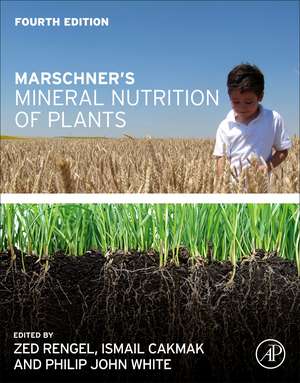Marschner's Mineral Nutrition of Plants
Editat de Zed Rengel, Ismail Cakmak, Philip John Whiteen Limba Engleză Paperback – 12 dec 2022
Marschner's Mineral Nutrition of Plants, 4th Edition, is divided into two parts: Nutritional Physiology and Plant–Soil Relationships. In Part I, emphasis is put on uptake and transport of nutrients in plants, root–shoot interactions, role of mineral nutrition in yield formation, stress physiology, water relations, functions of mineral nutrients and contribution of plant nutrition to food nutritional quality, disease tolerance, and global nutritional security of human populations. In view of the increasing interest in plant–soil interactions. Part II focuses on the effects of external and internal factors on root growth, rhizosphere chemistry and biology, soil-borne ion toxicities, and nutrient cycling.
Now with color figures throughout, this book continues to be a valuable reference for plant and soil scientists and undergraduate and graduate students in the fields of plant nutrition, nutritional physiology, and soil fertility.
- Offers new content on the relationship between climate change, soil fertility and crop nutrition
- Keeps overall structure of previous editions
- Includes updates in every chapter on new developments, ideas and challenges
Preț: 701.21 lei
Preț vechi: 897.17 lei
-22% Nou
Puncte Express: 1052
Preț estimativ în valută:
134.18€ • 146.20$ • 113.06£
134.18€ • 146.20$ • 113.06£
Carte tipărită la comandă
Livrare economică 16-30 aprilie
Livrare express 19-25 martie pentru 124.19 lei
Preluare comenzi: 021 569.72.76
Specificații
ISBN-13: 9780128197738
ISBN-10: 0128197730
Pagini: 816
Ilustrații: 300 illustrations (100 in full color)
Dimensiuni: 216 x 276 x 43 mm
Greutate: 2.09 kg
Ediția:4
Editura: ELSEVIER SCIENCE
ISBN-10: 0128197730
Pagini: 816
Ilustrații: 300 illustrations (100 in full color)
Dimensiuni: 216 x 276 x 43 mm
Greutate: 2.09 kg
Ediția:4
Editura: ELSEVIER SCIENCE
Public țintă
Plant scientists from the disciplines of plant nutrition, physiology and breeding as well as soil scientists and agronomists with interest in nutrition of plants; advanced undergraduate/graduate students studying plant nutrition and soil fertility.Further target audiences are professionals involved in food security and climate change research programs.
Cuprins
Part I. Nutritional Physiology
1. Introduction, definition and classification of nutrients
2. Ion-uptake mechanisms of individual cells and roots: short-distance transport
3. Long-distance transport in the xylem and phloem
4. Uptake and release of elements by leaves and other aerial plant parts
5. Mineral nutrition, yield, and source-sink relationships
6. Functions of macronutrients
7. Micronutrients
8. Beneficial elements
9. Mineral nutrition on crop quality
10. Relationship between mineral nutrition, plant diseases and pests
11. Diagnosis and prediction of deficiency and toxicity of nutrients
Part II. Plant-Soil Relationships
12. Nutrient availability in soils
13. Genetic and environmental regulation of root growth and development
14. Rhizosphere chemistry influencing plant nutrition
15. Rhizosphere biology
16. Nitrogen fixation
17. Nutrient-use efficiency
18. Plant responses to soil-borne ion toxicities
19. Nutrition of plants in a changing climate
20. Nutrient and carbon fluxes in terrestrial agroecosystems
1. Introduction, definition and classification of nutrients
2. Ion-uptake mechanisms of individual cells and roots: short-distance transport
3. Long-distance transport in the xylem and phloem
4. Uptake and release of elements by leaves and other aerial plant parts
5. Mineral nutrition, yield, and source-sink relationships
6. Functions of macronutrients
7. Micronutrients
8. Beneficial elements
9. Mineral nutrition on crop quality
10. Relationship between mineral nutrition, plant diseases and pests
11. Diagnosis and prediction of deficiency and toxicity of nutrients
Part II. Plant-Soil Relationships
12. Nutrient availability in soils
13. Genetic and environmental regulation of root growth and development
14. Rhizosphere chemistry influencing plant nutrition
15. Rhizosphere biology
16. Nitrogen fixation
17. Nutrient-use efficiency
18. Plant responses to soil-borne ion toxicities
19. Nutrition of plants in a changing climate
20. Nutrient and carbon fluxes in terrestrial agroecosystems
